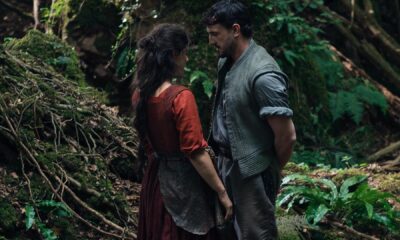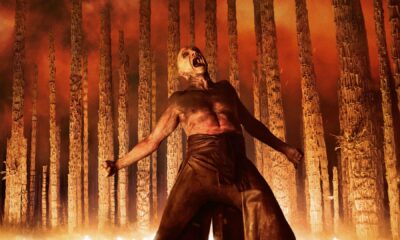

Featured Review
London Film Festival 2025 – Resurrection ★★★★★
Released: TBC (London Film Festival)
Director: Bi Gan
Starring: Jackson Yee
There’s an enchantingly blissful aura around the works of Bi Gan, as if time just seems to stop for them. At merely 36 years of age, he is a bit of an enigma: seen as a truly prodigious figure in cineaste circles, the dreamy Chinese auteur is one of the most exciting figures working today, hence the confused sentiments around his cinematic repertoire. Not quite “slow cinema” and certainly devoid of mainstream appeal (despite the sisyphean efforts from the Chinese distributors to market his sophomore feature as a conventional love story), Bi’s oeuvre is best exemplified by the director’s natural affinity for poetry and his unwavering belief in the evocative power of the image. Bi’s latest, the kaleidoscopic Resurrection, dares to establish a closer link with the moving image; a kind of symbiotic relationship where cinema and its viewer have to merge into a single entity — only to melt together at the dawn of the apocalypse. Equal parts transfixing and deeply moving, Resurrection is a testament to the malleable quality of the medium and an elegy for a culture born anew, a rich cinematic text that stands at the gates of a terrifying new era.
A behemoth almost 7 years in the making, Bi’s long-gestating potpourri of dreams works narratively within the mode of a portmanteau film: split into 5 distinct chapters—each reaffirming cinema’s connection to the human senses—the film is a multi-genre tale that spans across generations, differing geographies, and even organisms. The form is instantly overwhelming: Bi’s third feature opens with a silent film prologue, informing that in the future humans have uncovered the panacea for corporeal maladies — the society seen in Resurrection is characterized by its distinct lack of dreaming. The remaining brave souls are now called “deliriants”, whose aspirations are claimed to be dangerous and stigmatized, with the film’s opening delineating the life cycle of a dreamer: a Holy Motors-esque sympathy for the abject, set against the backdrop of a blistering homage to the French pioneers of filmmaking and the chiaroscuro of German expressionism. Other segments range from Buddhist monasteries that are transformed into places of grief, to doomed love stories on New Year’s Eve 1999; the film’s elaborately composed deck of cards is a masterful trick, an emphatic cinematic whiplash that wouldn’t function without its unified narrative.

It would be too easy (and, frankly, supremely tacky) to call Bi Gan’s Resurrection a “celebration of cinema”, a phrase that’s pretty much lost all meaning since it’s been applied to garish wide-eyed fetishizations of the art form. Rather than being a futile gesture, the film traces the histories of cinema—from its humble beginnings to the grand, operatic end it deserves—and questions our engagement with it as emotional escape from the terrors of reality. Bi’s work is so full of love for human beings, for art, for every waking moment spent feeling alive — there’s not an ounce of cynicism here. It’s almost as if his film becomes a canvas for the audience to paint on, a kind of cinematic absolution where each viewer is invited to establish a direct connection with the cinema screen to achieve greater understanding of themselves. For over two and a half hours, Bi operates on a purely sensory wavelength, enthusiastically playing with film form for the sole purpose of exposing his audience to the borderline uncanny wonders of dreaming. Resurrection is divine in its fittingly apocalyptic elegance; at a time when cinema is losing its grasp on handmade artistry to automated machines, along comes a film that is designed with personalized haptic visuality in mind.
One of my fondest memories is putting on the 3D glasses at a 2AM outdoor screening of Long Day’s Journey Into Night, letting the film’s metamorphic charm wash over all the senses. Bi’s signature oner wasn’t just a fancy gimmick but an integral part of the journey, culminating with a wonderfully stirring sequence of a world-conquering kiss. It was almost like being transported to some otherworldly realm, a mythical land where pure love governs over the Earthly laws of physics — powerful enough to make physical structures spin in unison with our hearts. Resurrection further elevates that concept, depicting death as the start of a newfound passion: where cinema ends, one holds the power to turn back time and transform it, to defiantly profess love at a time when the end of days is merely a matter of minutes. Bi understands that cinema is a fragile art form, an ephemeral wax figure that’s about to catch fire and burn with the blinding light of a thousand suns. Perhaps, it’s just the start of something new, yet that ultimately doesn’t matter. We are right on the cusp of waking up — Resurrection reminds us that dreams are eternal.
-

 Featured Review4 weeks ago
Featured Review4 weeks agoHamnet ★★
-

 Featured Review3 weeks ago
Featured Review3 weeks ago28 Years Later: The Bone Temple ★★★★
-

 Movie Reviews3 weeks ago
Movie Reviews3 weeks agoPeople We Meet On Vacation ★★★
-

 Interviews2 weeks ago
Interviews2 weeks agoInterview With Director Philippa Lowthorpe (H Is For Hawk)
-

 Featured Review2 weeks ago
Featured Review2 weeks agoRental Family ★★★★
-

 Features2 weeks ago
Features2 weeks agoMM Shorts – The Estrogen Gospel (Robyn Adams)
-

 Features2 weeks ago
Features2 weeks agoRehna’s Round-Up: 2026 Awards Season So Far
-

 Featured Review5 days ago
Featured Review5 days agoReturn To Silent Hill ★★★★





